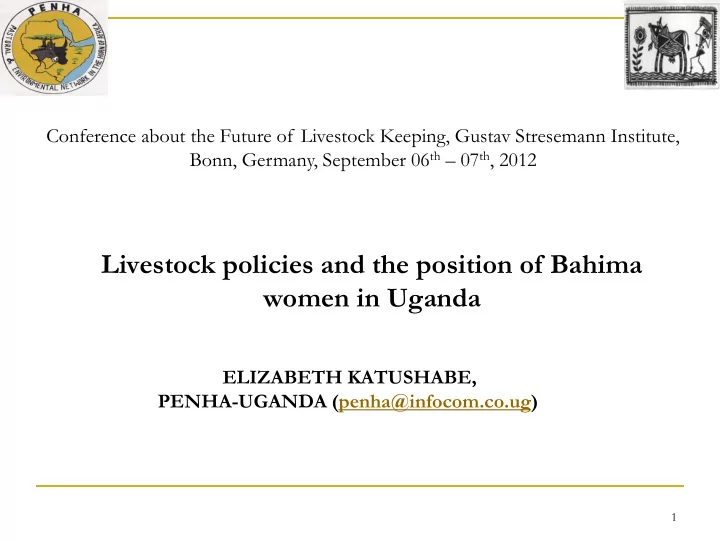

Conference about the Future of Livestock Keeping, Gustav Stresemann Institute, Bonn, Germany, September 06 th – 07 th , 2012 Livestock policies and the position of Bahima women in Uganda ELIZABETH KATUSHABE, PENHA-UGANDA (penha@infocom.co.ug) 1
The Ankole Long horn cattle (Local names: Nyankole, Sanga or Nsagalla ) 2
The Ankole Longhorn Cattle breed Original breeders: Bahima community of former Ankole Kingdom of the south western part of Uganda Also found in Rwanda, Congo, Southern Sudan, and being bred in Texas Breed well adapted to harsh conditions Milk production relatively high for local breed 3
Bahima women`s cattle and land rights Traditionally women were owned by their male family members i.e. father, brother, husbands, uncles and male guardians Therefore they did not own cattle or land – for example all gifts given to a bride would belong to her husband. 4
Bahima women ’ s contribution to sustain Ankole long horn cattle breed Women take care of calves, cleaning their kraal, cutting grass for the newly born, grazing older ones near home. They can tell the unhealthy ones from their dung. Some milk cows, graze and water them, especially when there are not enough males in the family. Formerly women used to control the milk in the home. They collected the milk and decided how much each family member could drink and how much to keep for churning. 5
A Muhima woman in her home, sitting strategically next to the milk pots and gourds. 6
Each family member drinks milk from a specific cow, the woman of the home makes the decision 7
Women and girls churn milk to produce ghee 8
Exotic breeds, commercialized dairy production and change in gender roles Since early 1990 ’ s policies stimulated the Bahima families to rear Frisian dairy cows to produce milk for the market. This affects the position of Bahima women: they do not have exclusive control over milk any more, since men take most of the milk to the markets. More malnutrition of children. Women ’ s main source of income has been tampered with, they are being pushed out and the social system has changed dramatically. 9
Contributions of civil society organizations Education and community sensitization on women ’ s rights – this has empowered both men and women, thus some women own cattle and land. Women groups have been formed to generate alternative income – joint milk collection and ghee production and marketing.
Today some women groups own milk coolers, sell milk and make yoghurt… 11
…and employ men… 12
…and produce and market ghee. 13
Today: Women select breeds, decide which to take to the market or give to a friend, and they employ men (labourers) to do some work for them. They prefer Ankole Longhorn because they are easy to manage and do not need a lot of pampering. Since 1991 my old mother has been taking care of the family cattle which enabled us (her children) to own and rear cattle while we do other jobs far in the capital city. 14
Recommendations related to policies Introduction of exotic breeds has seriously affected the position of Bahima women and their children. Civil society organizations are working to strengthen women ’ s position. Gender should be integrated into all project design by identifying gendered constraints, opportunities and accepted beliefs related to livestock production and marketing. 15
Gender mainstreaming contd… Gender mainstreaming in livestock initiatives is very important at this moment in time. All project designers and implementers should understand the importance of addressing gender issues to meet the practical needs of both men and women by analysing the context of gender and livestock. 16
Policies should reduce marginalization of a Muhima woman THANK YOU 17
Acknowledgements Reference Report on Breed Documentation in Nyabushozi [ by PENHA, 2009]. Individuals interviews (Bahima women and men) Ilse Köhler-Rollefson; FAO.2012. Invisible Guardians, Women manage livestock diversity, FAO animalProduction and Health Paper no .174.Rome,Italy 18
Recommend
More recommend